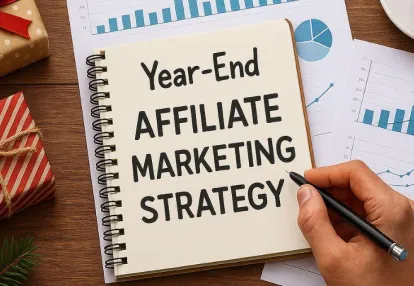
Our tools monitor millions of native, push, pop, and TikTok advertising campaigns.
Get StartedHow AI Helps Affiliates Predict Winning Offers has become a game-changing reality in digital marketing. You're no longer guessing which products will resonate with your audience or throwing campaigns against the wall to see what sticks.
AI in affiliate marketing acts as your data analyst, strategist, and forecaster rolled into one. It processes massive amounts of user behavior data, identifies patterns invisible to the human eye, and delivers actionable insights that point you toward high-converting offers before you invest a single dollar.
Predicting winning offers separates profitable affiliates from those barely breaking even. You need to know which products will convert, when they'll perform best, and who will buy them. Traditional methods rely on historical performance and gut feelings. AI-powered affiliate tools eliminate this guesswork by analyzing real-time signals—from browsing patterns to seasonal trends—and forecasting which offers will generate the highest returns. This shift from reactive testing to proactive selection transforms how you build campaigns and dramatically impacts your bottom line.
Artificial intelligence (AI) refers to a set of technologies that allow computers to learn from data patterns and make intelligent decisions without being explicitly programmed. At its core, machine learning—a subset of AI—trains algorithms on historical data to recognize patterns and predict future outcomes with increasing accuracy over time.
The integration of AI affiliate marketing tools into modern platforms happens through APIs and built-in features that connect data sources, analyze performance metrics, and execute optimized actions automatically. These systems continuously process information from your campaigns, user interactions, and conversion data to identify what works and what doesn't.
Affiliate marketing automation powered by AI delivers three critical advantages:
The technology behind AI offer optimization affiliate marketing examines variables like click-through rates, conversion patterns, traffic sources, and user demographics simultaneously. This multi-dimensional analysis reveals hidden correlations between factors that influence purchase decisions, enabling you to predict which offers will resonate with specific audience segments before you invest significant resources.
Moreover, the potential of AI in managing affiliate programs is vast. It goes beyond content creation and can be leveraged to recruit affiliates, research trends, benchmark affiliate performance, and more.
For those looking to maximize their earnings through affiliate marketing, joining an affiliate program like Anstrex can be a lucrative opportunity. With the potential to earn substantial commissions from referred customers, such programs offer a practical application of these advanced AI tools in real-world scenarios.
Data-driven insights form the backbone of AI's predictive capabilities in affiliate marketing. You can now identify winning offers before investing significant resources, thanks to sophisticated algorithms that process massive datasets in seconds. This shift from guesswork to precision targeting fundamentally changes how you approach offer selection.
AI systems monitor real-time user behavior across multiple touchpoints, capturing every click, hover, scroll depth, and time spent on specific content. These platforms analyze patterns that human marketers would miss—like the exact moment users abandon their carts or which product images generate the most engagement. You get immediate insights into which offers resonate with your audience based on their actual interactions, not assumptions.
The technology tracks micro-conversions throughout the customer journey. When someone views a product three times within 24 hours, AI recognizes this as high purchase intent and automatically prioritizes similar offers for that user segment.
Predictive analytics for affiliates extends beyond basic user data. AI incorporates external variables that influence purchasing decisions:
A fitness supplement offer might perform differently in Miami during summer versus Chicago in winter. AI captures these nuances and adjusts recommendations accordingly.
Machine learning models analyze historical conversion data to forecast consumer preferences months in advance. These algorithms identify seasonal trends, predict emerging product categories, and spot declining interest before it impacts your revenue. You can stock your promotional calendar with offers that align perfectly with anticipated demand curves.
Predictive analytics affiliates use these models to prioritize offers based on probability scores. Instead of promoting 50 products with equal effort, you focus on the 10 that AI predicts will generate 80% of your conversions. This data-backed approach eliminates the trial-and-error phase that traditionally drains affiliate budgets.
The hyper-personalization capabilities mean you're not just targeting demographics—you're reaching individuals with offers matched to their specific browsing history, purchase patterns, and predicted needs.
AI offer optimization has become accessible through specialized affiliate marketing tools designed to streamline your campaign management. Platforms like Voluum, RedTrack, and Affise integrate machine learning algorithms that automatically adjust offer placements based on performance metrics you care about most.
These platforms analyze which offers resonate with specific audience segments and automatically rotate underperforming options out of your campaigns. You get real-time recommendations on which products to promote to which users, eliminating the guesswork that traditionally plagued affiliate selection.
Automated A/B testing represents a game-changer for affiliates who previously spent hours manually comparing offer variations. AI-powered tools continuously test different:
The system identifies winning combinations faster than manual testing ever could, often within hours rather than weeks. You receive actionable insights showing exactly which elements drive conversions for your specific traffic sources.
How AI Helps Affiliates Predict Winning Offers extends beyond prediction into execution. Tools like Smartly.io and Optimizely use neural networks to optimize creative elements across multiple channels simultaneously. Your conversion rates improve because the AI continuously learns from every click, view, and purchase, refining its recommendations with each interaction.
The beauty lies in scalability—you can test dozens of offer combinations across multiple traffic sources without increasing your workload.
Traditional last-click attribution models give credit to the final touchpoint before conversion, but this approach misses the complete picture of your customer's journey. Multi-touch attribution powered by AI reveals every interaction that influenced a purchase decision, from initial awareness to final conversion.
AI performance tracking for affiliates analyzes data across email campaigns, social media interactions, blog content, and paid advertisements simultaneously. You gain visibility into which channels work together to drive conversions, not just which one happened to be last. Machine learning algorithms assign weighted credit to each touchpoint based on its actual influence on the buying decision.
Customer journey mapping becomes exponentially more sophisticated with AI. The technology tracks anonymous visitors as they move between devices and platforms, connecting seemingly disconnected interactions into coherent user profiles. You see patterns like:
This granular insight transforms resource allocation decisions. You identify which content types generate initial interest versus which channels close sales. Instead of cutting budgets for channels that don't show last-click conversions, you recognize their role in the broader conversion path and invest accordingly. AI continuously refines these attribution models as it processes more data, improving accuracy over time.
Traditional affiliate marketing operates on a reactive model—you launch campaigns, wait for results, then adjust based on what worked or failed. AI fundamentally shifts this paradigm by enabling proactive optimization that anticipates market shifts before they happen.
Automation in affiliate marketing powered by AI continuously monitors performance indicators and adjusts campaigns in real-time without manual intervention. You're no longer chasing trends after competitors have already capitalized on them. Instead, predictive algorithms identify emerging opportunities by analyzing patterns across millions of data points, allowing you to position winning offers ahead of market saturation.
The transformation happens through:
The most successful affiliates recognize that automation doesn't replace human insight—it amplifies it. You maintain creative control over messaging, brand partnerships, and relationship building while AI handles data processing and optimization at scales impossible for manual management. This hybrid approach combines the efficiency of machine learning with the authenticity and strategic thinking that only human marketers provide.
Your role evolves from campaign executor to strategic orchestrator, focusing on high-level decisions while AI manages the granular optimizations that drive consistent profitability.
The future of affiliate marketing belongs to those who embrace intelligent automation. AI tools and analytics have fundamentally reshaped how you identify opportunities, allocate resources, and maximize returns. You're no longer guessing which offers will perform—you're making decisions backed by predictive models that process millions of data points in seconds.
How AI Helps Affiliates Predict Winning Offers isn't just about technology—it's about gaining a competitive edge in an increasingly crowded marketplace. The affiliates who thrive are those who combine machine precision with human creativity, letting algorithms handle the heavy lifting while you focus on strategy and relationship building.
You have access to tools that were science fiction a decade ago. The question isn't whether AI will transform your affiliate business—it's whether you'll adopt these technologies before your competitors do. The data is clear: AI-driven success isn't coming; it's already here. Your move is to integrate these capabilities into your workflow and watch your conversion rates climb.
Receive top converting landing pages in your inbox every week from us.
Announcement
Micro-influencers can be your secret weapon for driving more holiday sales through affiliate marketing. Learn how to identify the right partners, craft compelling offers, and track performance effectively. Discover why smaller creators often deliver higher engagement and stronger conversions. Perfect for marketers looking to maximize ROI with authentic, trust-based influencer collaborations.
Rachel Thompson
7 minDec 20, 2025
How-To
The end of third-party cookies is reshaping affiliate marketing, but adaptation brings new opportunities. Learn how to implement privacy-friendly tracking solutions that maintain accuracy and performance. Discover technologies and strategies to future-proof your campaigns and stay compliant in 2025. Perfect for affiliates determined to thrive in a cookieless digital landscape.
Samantha Reed
7 minDec 14, 2025
How-To
The holiday season offers unmatched opportunities for affiliates to maximize earnings. Learn how to craft a year-end strategy that leverages limited-time offers, seasonal trends, and audience insights. Discover actionable ways to optimize campaigns and boost conversions before the year closes. Perfect for affiliates looking to turn festive traffic into lasting revenue.
Samantha Reed
7 minDec 6, 2025



